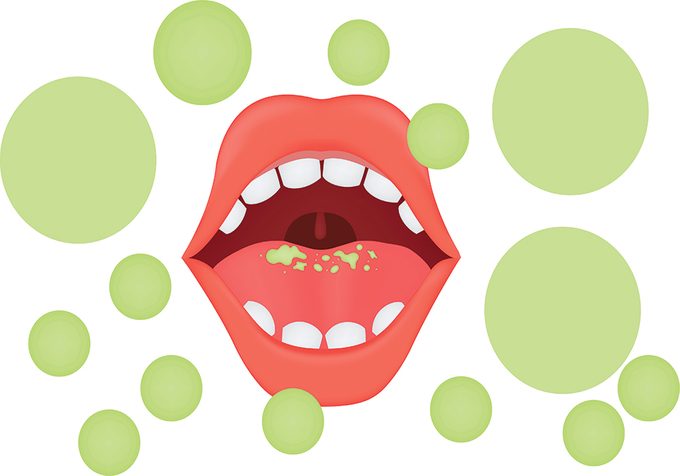How To Get Rid of Bad Breath, Once and For All
We asked two experts for their advice on battling bad breath.

I’m So Embarrassed By My Bad Breath, What Can I Do?
The Naturopath Says:
First, don’t assume it’s your fault! Most people with bad breath are quick to blame themselves, but the problem isn’t always related to oral hygiene. In fact, it often stems from other causes, such as bacterial and yeast infections. These could be present in your mouth, throat, nose, sinuses or digestive tract. If it’s a bacterial infection, antibiotics may be needed, which can be prescribed by your medical doctor or dentist.
For a yeast overgrowth, often caused by antibiotics used to treat bacterial infections or a diet high in sugar, I often recommend taking caprylic acid (derived from coconut oil) and psyllium, shaken or blended into a glass of water, once a day. Another option is a combination of probiotics, pau d’arco (an antibacterial herb) and grapefruit seed extract, all of which can be taken orally. As well, taking probiotics to repopulate gut flora is essential.
An unhealthy gut can also be to blame for bad breath. Low acid production in the stomach, low bile production in the liver and decreased digestive enzymes can reduce the breakdown of foods in the gut, resulting in decomposition and a foul odour. Herbs like globe artichoke, dandelion and gentian root naturally promote acid production in the stomach and bile release from the liver. I prescribe these to my patients in supplement form with great success (exact dosages should be determined by a practitioner). Animal or plant-based digestive enzymes can also be taken when needed to keep your gut healthy and your breath fresh.
There are several things I recommend in general to prevent bad breath. A big one is to drastically reduce your sugar intake. This can prevent and treat bad-breath-causing infections by not feeding the bacteria in your mouth or the yeast population in your digestive tract, both of which thrive on the sweet stuff. I also suggest using a low-sugar toothpaste, such as Tom’s of Maine, and rinsing your mouth with water after brushing.
Chew gum that contains xylitol rather than aspartame or sugar, as xylitol reduces bacteria in the mouth and protects against cavities. Daily sinus rinses using a neti pot can keep nasal passages clean and help wash away infection.
Oil pulling can also reduce the oral microbe population by cutting down on tartar and promoting healthy, infection-resistant gums. Forcefully swish one or two teaspoons of coconut oil in your mouth and through the teeth for about 20 minutes (or as long as you can).The idea is that the oil attracts the fatty layer of the cell wall of microbes, allowing them to attach to the oil to pull them out of tissues or dissolving the cell wall and actually killing the microbes.
As per all health advice, oversight by a qualified healthcare professional such as a naturopathic doctor, is advised.
Dr. Patricia Wales is a naturopath in Calgary.
The Dentist Says:
There are many causes of halitosis, the clinical term for bad breath, but diet is an obvious place to look for a solution. Onions, garlic, spices and dairy products are common offenders. Garlic and onions have a strong odour but also contain compounds that get absorbed into the bloodstream and can be released through the lungs, creating a second wave of bad breath. Dairy contains amino acids that bacteria from the mouth feed on, which causes them to release a foul odour. Smoking is another common cause of halitosis because it diminishes the oxygen available in the mouth, creating a viable environment for bacteria-causing gum disease and periodontitis.
While oral hygiene isn’t always the cause, it can be the solution. That’s because bacteria accumulates easily on the teeth, soft tissue and tongue, causing inflammation, gingivitis, cavities and even periodontitis with bone loss, where pockets develop around the teeth and create a haven for bacteria that’s impossible to clean with home care.
Prevention is crucial, and good oral care means brushing your teeth for two or three minutes twice a day and flossing once a day. Mouthwash may temporarily mask bad breath, but it doesn’t help clean your mouth or correct the problem unless it’s an antibiotic or antifungal rinse prescribed by a dentist. Mouthwashes that contain alcohol are a no-no because they can exacerbate dry mouth – another cause of halitosis.
Saliva is very beneficial to oral heath, as it naturally cleans the mouth and has a buffering and antimicrobial effect. That’s why staying hydrated is also very important for fresh breath.
It’s important to discuss recurring bad breath with your dentist. If the source is gum disease or oral infections caused by yeast or other pathogens, your dentist will be able to treat these issues with proper care, including gingival curettage (a deep under-the-gum cleaning), antifungal mouth rinses and even surgical treatments. If the source is extra-oral, like gastric reflux or certain metabolic conditions, your dentist can guide you to a physician that will be able to care for your concerns.
Dr. Gabrielle Lemay is a dentist in Westmount, QC.
Recommended:




